In 2024, Amrita Vishwa Vidyapeetham collaborated with non-governmental organisations (NGOs) to advance the Sustainable Development Goals (SDGs) through structured student volunteering programmes, applied research collaborations, and the co-development of educational resources. These engagements were implemented through institutional platforms including SustIN, the National Service Scheme (NSS), AYUDH, and Embracing the World, enabling sustained partnerships with civil society at local, national, and international levels.
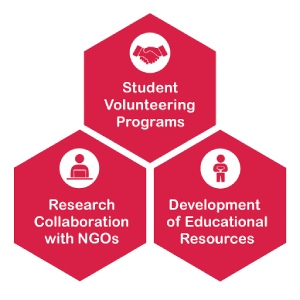
Amrita facilitates structured student volunteering programmes in partnership with NGOs and its parent organisation, Mata Amritanandamayi Math, enabling immersive, SDG-aligned community engagement. Through these programmes, students apply academic learning to real-world sustainability challenges while contributing directly to community development.
Key volunteering initiatives undertaken with NGO partners include:
Through NSS and AYUDH, students also engaged in health camps, first-aid and CPR training, blood donation drives, eye-care camps, and public cleanliness initiatives in collaboration with hospitals, government agencies, and NGOs.



National Service Scheme (NSS): Community and Civic Engagement
Amrita’s National Service Scheme (NSS) units conducted a range of structured volunteering activities in collaboration with hospitals, government agencies, and public institutions.
Health and Safety Initiatives
Blood Donation Camps
First Aid and CPR Awareness Programme
General Eye Check-up Camp
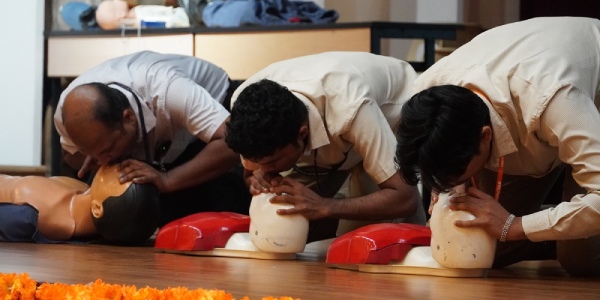
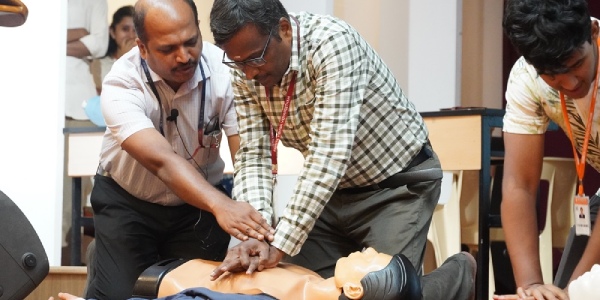
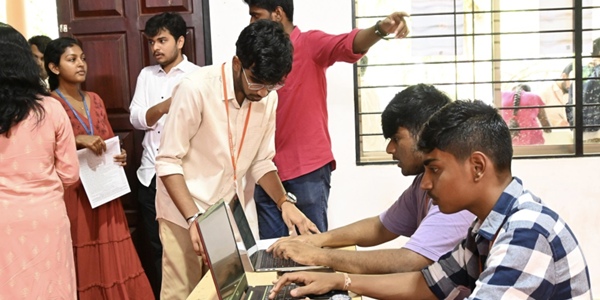
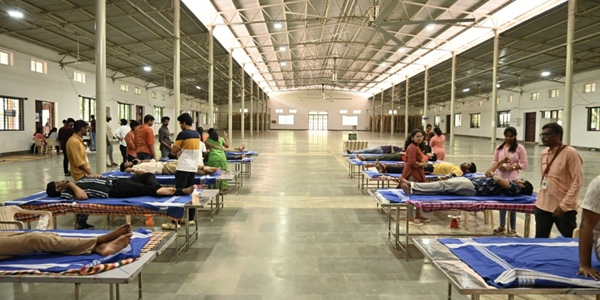
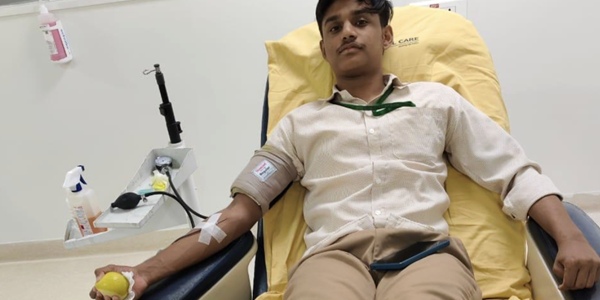
Environmental Stewardship and Public Cleanliness
Swachhata Hi Seva 2024 – Ettimadai Railway Station
Bamboo Plantation Drive – Ettimadai Forest Area (Unit II)
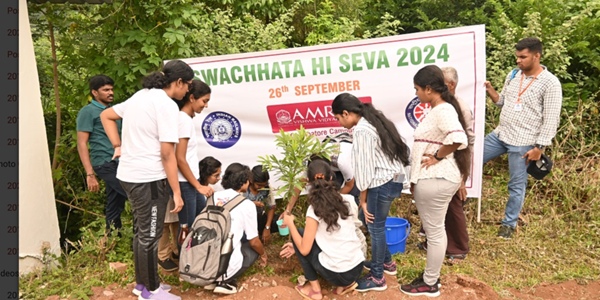
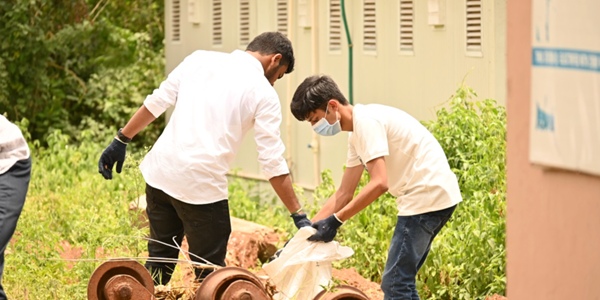
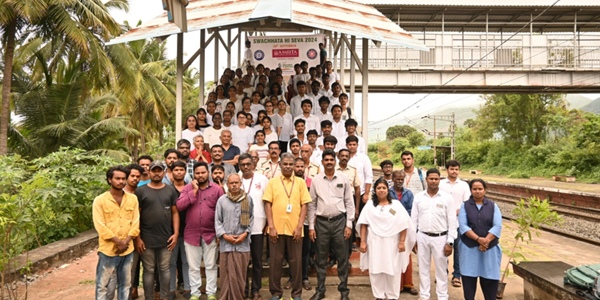
Education and Social Outreach
In 2024, Amrita Vishwa Vidyapeetham advanced SDG-aligned research collaboration with non-governmental organisations (NGOs) through the International Network for Sustainable Innovation and Resilient Futures (SustIN) under the UNESCO Chair on Experiential Learning for Sustainable Innovation and Development. SustIN functions as a structured research collaboration platform, systematically connecting civil society organisations (CSOs) and NGOs with academic researchers to co-design, implement, and validate applied research addressing sustainability challenges.
Through these collaborations, NGOs contribute field-level data, community access, implementation insights, and validation of research outcomes, while academic partners provide interdisciplinary research expertise, analytical frameworks, and evidence generation. This integrated model ensures that research outputs are community-driven, policy-relevant, and adaptable across regional and global contexts, directly supporting SDG implementation.
SDG-Focused Research Themes
Research collaborations facilitated through SustIN in 2024 addressed priority SDG areas including:



List of CSO’s and the SDG Collaboration:
| CSO | SDGs Addressed Through MoU |
| CAN South Asia (CANSA) | SDG 13 (Climate Action), SDG 7 (Affordable and Clean Energy), SDG 11 (Sustainable Cities and Communities) |
| Vasudha Foundation | SDG 7 (Affordable and Clean Energy), SDG 13 (Climate Action), SDG 12 (Responsible Consumption and Production) |
| Global Peace Foundation | SDG 16 (Peace, Justice, and Strong Institutions), SDG 4 (Quality Education), SDG 17 (Partnerships for the Goals) |
| Industree Foundation | SDG 8 (Decent Work and Economic Growth), SDG 12 (Responsible Consumption and Production), SDG 5 (Gender Equality) |
| TEAMEnvironment KENYA | SDG 15 (Life on Land), SDG 13 (Climate Action), SDG 6 (Clean Water and Sanitation) |
| Agrani Bharat Abhiyan | SDG 1 (No Poverty), SDG 2 (Zero Hunger), SDG 8 (Decent Work and Economic Growth) |
| Gram Vikas | SDG 6 (Clean Water and Sanitation), SDG 3 (Good Health and Well-being), SDG 11 (Sustainable Cities and Communities) |
| Energy Swaraj Foundation | SDG 7 (Affordable and Clean Energy), SDG 13 (Climate Action), SDG 11 (Sustainable Cities and Communities) |
Children’s Investment Fund Foundation | SDG 3 (Good Health and Well-being), SDG 13 (Climate Action), SDG 4 (Quality Education) |
WOTR (Watershed Organisation Trust) | SDG 15 (Life on Land), SDG 6 (Clean Water and Sanitation), SDG 13 (Climate Action) |
| POP (Protect Our Planet) Movement | SDG 13 (Climate Action), SDG 17 (Partnerships for the Goals), SDG 4 (Quality Education) |
NGO Research Partners and SDG Alignment
Amrita’s SustIN-enabled research collaborations included formal MoUs with NGOs such as:
| NGO / CSO Partner | SDGs Addressed |
|---|---|
| CAN South Asia (CANSA) | SDG 7, SDG 11, SDG 13 |
| Vasudha Foundation | SDG 7, SDG 12, SDG 13 |
| Global Peace Foundation | SDG 4, SDG 16, SDG 17 |
| Industree Foundation | SDG 5, SDG 8, SDG 12 |
| TEAMEnvironment Kenya | SDG 6, SDG 13, SDG 15 |
| Agrani Bharat Abhiyan | SDG 1, SDG 2, SDG 8 |
| Gram Vikas | SDG 3, SDG 6, SDG 11 |
| Energy Swaraj Foundation | SDG 7, SDG 11, SDG 13 |
| Children’s Investment Fund Foundation | SDG 3, SDG 4, SDG 13 |
| WOTR | SDG 6, SDG 13, SDG 15 |
| POP (Protect Our Planet) Movement | SDG 4, SDG 13, SDG 17 |
In 2024, Amrita Vishwa Vidyapeetham advanced SDG-aligned curriculum development and educational resource creation through structured collaboration with non-governmental organisations (NGOs), community organisations, and educators, coordinated through the International Network for Sustainable Innovation and Resilient Futures (SustIN) and the UNESCO Chair on Experiential Learning for Sustainable Innovation and Development. These partnerships integrate academic expertise with lived community experience, resulting in interdisciplinary, values-based educational resources designed to build practical capacity for sustainability and resilience.
1. Educational Resource Development: Embrace of Compassion – Indian Ocean Tsunami 2004
In collaboration with NGOs and its parent organisation, Mata Amritanandamayi Math, Amrita published the educational resource Embrace of Compassion: Indian Ocean Tsunami 2004 – Swift Transformation & Community Resilience. Developed from two decades of NGO engagement, community-based research, and humanitarian practice, the publication documents best practices in disaster response, relief coordination, and long-term recovery.
The resource is used for teaching, training, and professional learning, supporting experiential education for students, practitioners, and policymakers. The publication contributes directly to SDG 11 (Sustainable Cities and Communities), SDG 13 (Climate Action), and SDG 17 (Partnerships for the Goals) by translating field experience into structured learning content.
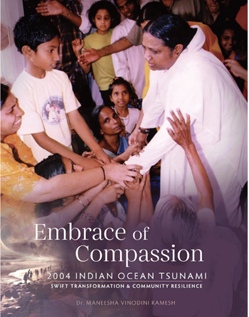
2. Global Dissemination of Disaster-Resilience Educational Resources (UNESCO-IOC, Indonesia)
In November 2024, Amrita disseminated its disaster-resilience educational resources at the 2nd UNESCO-IOC Global Tsunami Symposium in Banda Aceh, Indonesia. Representing Amrita and Mata Amritanandamayi Math, faculty presented educational case studies, community-based resilience frameworks, and visual learning materialsdeveloped through long-term NGO collaboration.
The accompanying exhibition functioned as a pedagogical platform, enabling global educators, policymakers, and practitioners to access structured learning resources on disaster preparedness and recovery, strengthening education and capacity-building related to SDG 11, SDG 13, and SDG 17.
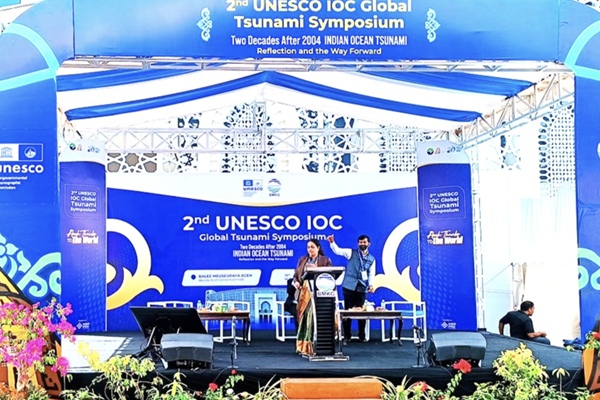
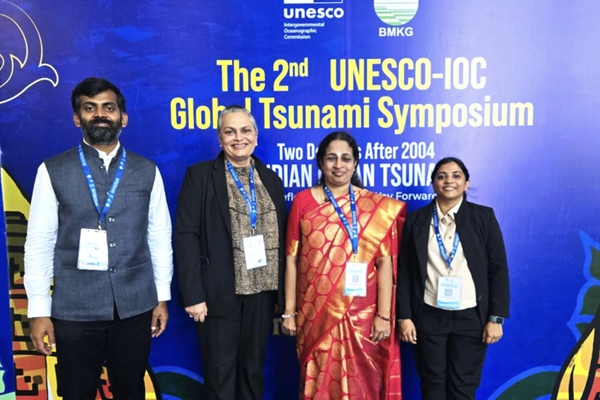
3. Certificate Course on Building Disaster Resilience and Social Responsibility
In 2024, Amrita developed a Certificate Course on Building Disaster Resilience and Social Responsibility through Experiential Learning, designed under the UNESCO Chair and scheduled for pilot delivery in 2025. The curriculum was co-developed with NGO practitioners and community experts, targeting educators, youth leaders, NGO professionals, and local government officials.
The course curriculum includes climate change adaptation, disaster-management lifecycles, indigenous knowledge systems, early-warning technologies, health and psychosocial support, and NGO–government collaboration. Developed in 2024, the programme strengthens SDG 4 (Quality Education) while supporting SDG 11, SDG 13, and SDG 17 through structured capacity-building for community-level resilience.
Last Update : December 1, 2024



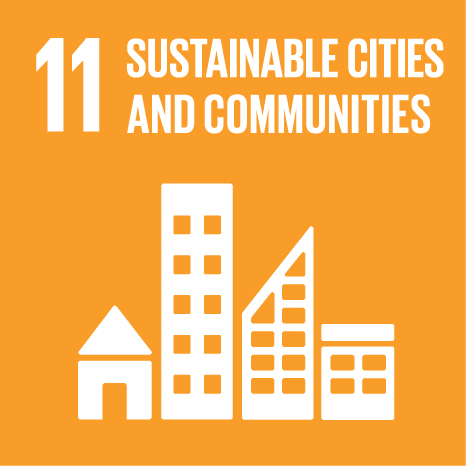
Amrita Vishwa Vidyapeetham has established itself as a leading institution in collaborating with non-governmental organizations to advance the Sustainable Development Goals through three complementary approaches: comprehensive student volunteering programmes, research initiatives that co-create knowledge with NGO partners, and systematic development of educational resources addressing critical development challenges. The university’s multifaceted approach demonstrates how academic institutions can serve as catalysts for social change by mobilizing student energy, faculty expertise, and institutional resources in partnership with civil society organizations. Through strategic NGO collaborations, Amrita has created ecosystems where learning, research, and development action reinforce one another, generating sustainable impact while transforming student consciousness and commitment to social responsibility.
Amrita Vishwa Vidyapeetham mobilizes student volunteers through multiple structured programmes aligned with the Sustainable Development Goals, all coordinated through partnerships with non-governmental organizations working in communities across India. These programmes address a comprehensive range of development challenges including poverty reduction, health and well-being, quality education, environmental sustainability, and gender equality. The primary student volunteering initiatives include Amrita Learning to Integrate Values & Excellence (ALIVE), Sahaya (the social outreach club), Amrita Quench (the water harvesting and conservation club), and the National Service Scheme (NSS), all of which operate in close coordination with NGOs to ensure relevance, effectiveness, and sustainability of interventions.
Through the NSS Mental Health Initiatives, Amrita’s student volunteers engaged in profound service targeting vulnerable populations throughout 2024. On February 22, 2024, students organized the Mental Health Marathon “Empower Your Every Step: Reset and Refresh,” creating a physical and emotional space where community members—particularly those from disadvantaged backgrounds—could confront stigma surrounding mental health and access information on mental wellness. A week earlier, on February 15, 2024, the university hosted the workshop “Happiness is a Choice,” an initiative that sowed seeds of hope and resilience among participants by providing practical tools for psychological well-being and stress management. These mental health awareness campaigns were coordinated with mental health professionals and community organizations, ensuring that messaging was evidence-based and culturally appropriate for the communities served.
Through ALIVE, Sahaya, and NSS programmes, student volunteers engaged in comprehensive community service activities targeting vulnerable populations. Volunteers visited old-age homes, bringing companionship to elderly individuals often abandoned by society and providing social support that contributes to mental health and well-being. Students spent time at orphanages, providing care and attention to children without family support, contributing directly to SDG 5 (Gender Equality) and SDG 4 (Quality Education) by ensuring all children have access to supportive environments. Through partnerships with homes for mentally-challenged people, student volunteers offered dignity and inclusion to those marginalized by disability, contributing to SDG 10 (Reduced Inequalities) by challenging stigma and promoting social inclusion. Students organized blood donation camps, literally saving lives while providing free health screening to disadvantaged communities, advancing SDG 3 (Good Health and Well-Being). Importantly, these volunteering activities were conducted in partnership with health organizations, medical NGOs, and social service agencies, ensuring coordination, safety protocols, and alignment with professional standards.
Link: https://www.amrita.edu/unsdg-26/sdg3/health-outreach-programmes/
Amrita’s student volunteers engaged in awareness campaigns that transformed neighborhoods into learning communities on critical health issues. Health education sessions reached communities with messages on nutrition, malnutrition prevention, malaria control, and tobacco awareness, empowering villagers with knowledge to safeguard their own health and that of their families. These awareness campaigns were conducted in partnership with health NGOs and government health agencies, ensuring that information disseminated was accurate and aligned with national health policy. By integrating academic learning with community service, Amrita transformed its students into health ambassadors while directly improving population health outcomes, reducing health disparities, and fostering sustainable well-being across the communities served.
Amrita Vishwa Vidyapeetham engages in sophisticated research programmes developed in partnership with non-governmental organizations, creating knowledge systems where academic rigor combines with grassroots understanding to generate context-specific solutions for sustainable development challenges. The university’s School of Social and Behavioural Sciences, working through Ammachi Labs and various research centers, conducts extensive field-based research with NGO partners addressing gender equality, livelihoods, conservation, and community resilience. These research initiatives simultaneously serve as learning platforms for students and faculty while generating evidence that informs policy recommendations and development programmes.
Amrita Vishwa Vidyapeetham has long been committed to fostering sustainability, climate resilience, and environmental education through strategic collaborations with global and national organizations including UNESCO Chairs, international and national NGOs, and local authorities. These partnerships have enabled Amrita to implement programs that directly address global challenges like climate change, resource depletion, and sustainable development. From February 2023 to June 2024, Amrita organized various educational and policy-focused events addressing topics related to the environment, climate change, and achieving net-zero targets through collaborations with prominent NGOs, facilitating knowledge sharing on multiple environmental and climate topics.
The collaborating NGOs included CANSA (Climate Action Network South Asia), Industree, Vasudha Foundation, and Team Environment Kenya, bringing together organizations with expertise in climate policy, sustainable livelihoods, conservation, and international environmental governance. The dialogue addressed crucial topics including “Building Resilience in a Changing Climate: Strategies, Solutions & Collaborations,” which explored community-based adaptation approaches; “Decoding Results-based Climate Finance,” which examined mechanisms for climate finance governance; “Addressing Climate & Biodiversity with Local Stakeholders: Strategies, Challenges & Solutions,” which facilitated discussion of local-to-global policy linkages; “Climate Change: Intersections of Gender and Equity Concerns—Solutions from the Frontlines,” which examined how climate impacts and responses intersect with gender and social equity issues; “Adapting Architectural Design, Settlement Planning and Practice to Climate Change: An International Perspective,” which explored how built environment planning can adapt to climate change; “Gender Responsive Climate Action,” which examined how climate policies can advance gender equality; “Unveiling the Impacts of Climate Change and Fostering Environmental Sustainability in Africa,” which shared lessons from African contexts; “Climate Resilience Strategies for a Changing World,” which synthesized approaches to building resilience; and “Policy Dialogue on Reshaping Agriculture and Food Systems to face the Climate and Biodiversity Crisis,” which examined agricultural policy innovation.
Link: https://www.amrita.edu/unsdg-25/sdg13/enviromental-education/
The impact of these collaborative research and dialogue initiatives extended to more than 200 participants, including educators and students, across schools, colleges, and communities in India. Through these partnerships, Amrita and its NGO collaborators enhanced sustainable development literacy among educators and students, equipped communities with knowledge on disaster preparedness, raised awareness of energy-efficient technologies and sustainable energy systems, and contributed to policy development on climate action and environmental sustainability.
Amrita Vishwa Vidyapeetham has systematically conducted field-based research projects with prominent NGOs and government agencies focused on women’s empowerment and gender equality, with social work students and faculty playing central roles in data collection, community engagement, and preliminary analysis. In 2024, Amrita launched the next phase of its seaweed cultivation initiative titled “Blue is the New Pink: Women Driving Sustainable Seaweed Cultivation and Climate Solutions,” funded by the GEF Small Grants Programme (SGP) Operational Phase 7 and implemented with UNDP, the Ministry of Environment, TERI, ESRI, and Transworld Group. This phase aims at empowering 100 women from coastal communities in Ramanathapuram, Tamil Nadu, providing training in seaweed cultivation, seagrass restoration, and Integrated Multi-Trophic Aquaculture (IMTA), supporting both socio-economic development and marine ecosystem preservation.
On November 8, 2024, as part of the “Harmonising Livelihoods for Dugong Conservation” project—a collaborative initiative led by Amrita, Surabhi Foundation, and UNESCO India—60 students from Amrita’s Department of Social Sciences conducted intensive field studies, actively engaging in data collection, community interaction, and preliminary analysis in coastal villages. The students organized a 1.5 km beach cleanup at Kodiakara Beach in Manamelkudi, joined by local leaders and community members, with participants pledging to conserve the ocean and its species while painting awareness messages about Dugongs and seagrass. This integrated approach combined research data collection with environmental action and awareness-raising, demonstrating how student involvement in NGO-partnered research can simultaneously advance knowledge generation and environmental stewardship.
The Department of Social Work at Amrita Vishwa Vidyapeetham coordinates internship placements of Master of Social Work (MSW) and Bachelor of Social Work (BSW) students with non-governmental organizations across India, providing students with immersive field experience while contributing to NGO-led development programs. These internships, typically lasting a minimum of 7 days in intensive format or extending across summer periods, bridge the gap between theoretical knowledge and practical application by placing students in real-world environments such as non-governmental organizations, hospitals, educational institutions, and community centers. Through these placements, students work on critical social issues including poverty reduction, health care access, education, and social justice.
During summer internships conducted from June 1 to June 30, 2024, 46 students from the Master of Social Work programme were placed at various governmental and non-governmental organizations across India, gaining hands-on experience in practicing various methods of social work and developing skills as professional social workers. The internships required students to engage in community outreach, conduct awareness campaigns, implement surveys, and collaborate with local communities to identify and address pressing social issues. Through these placements, students organized events and distributed educational materials related to health, education, or social justice, gaining deep understanding of how development work operates in the field while contributing meaningfully to NGO programmes.
Additionally, during winter internship periods, MSW trainees provided a minimum of 7 days of immersive, hands-on experience in various social work settings coordinated with NGO partners. This winter internship programme exposed students to the varied aspects of social work practice through direct service delivery, policy analysis, community outreach, and programme evaluation. By engaging with diverse populations, especially in rural areas where traditional practices may affect the acceptance of modern social programmes, students gained deeper understanding of the role of social workers in diverse settings. The internship enhanced their practical skills while strengthening their commitment to social justice and community welfare.
Amrita Vishwa Vidyapeetham’s Live-in-Labs® programme represents the university’s flagship approach to research conducted in close partnership with non-governmental organizations, community-based organizations, and local government agencies. The programme is a multidisciplinary experiential learning programme that breaks classroom and lab barriers by applying learned theory in real-world settings. This credit-based academic programme draws on principles of lean research for the development and deployment of sustainable solutions for current challenges faced by rural communities in India. By directly living in rural communities (labs) and co-designing sustainable solutions with NGO partners and community members, programme participants gain first-hand knowledge along with the know-how of identifying and assessing community needs. Subsequently, viable solutions are developed and implemented through various participatory methods.
With over 300 projects implemented in 25 states across India, Live-in-Labs® participants have touched the lives of approximately 1 million rural residents since the programme’s inception in 2013. With participation from over 30 institutions around the world and nearly 50 departments, schools, and centers at Amrita, students and faculty have clocked in more than 400,000 hours in the field working towards sustainable development in rural communities. The programme’s reach across diverse geographic contexts, socio-economic conditions, and development challenges has enabled comparative analysis of what works in different settings, contributing to the development of flexible yet robust best practice frameworks. The Live-in-Labs® programme is offered internationally through the Live-in-Labs® International initiative, which enables international students and faculty to participate in projects for durations ranging from one to six months, depending on their availability. This international component of the programme facilitates knowledge exchange on best practices and allows international peers to learn from Amrita’s methodology while contributing their own expertise to project teams.
Amrita Vishwa Vidyapeetham develops comprehensive educational resources in partnership with non-governmental organizations, ensuring that these materials address real-world development challenges, incorporate community knowledge, and can be scaled across diverse contexts. The university’s approach to educational resource development combines academic expertise with grassroots experience, resulting in materials that are both theoretically sound and practically applicable.
Amrita’s UNESCO Chair on Experiential Learning for Sustainable Innovation and Development facilitates global curriculum development aligned to fourteen key SDGs through experiential and community-engaged learning methodologies in partnership with NGOs and academic institutions. Through consultations on curriculum development with academic partners and NGOs held during an International Symposium on Sustainable Innovation and Development (December 11-13, 2023), Amrita brought together experts including UNESCO Chairs, academicians, and development practitioners to deliberate, assess, and evaluate a global curriculum for sustainable development. Amrita has been spearheading the development of a comprehensive curriculum on sustainable development applicable to select 14 SDGs through the UNESCO Chair framework, with explicit integration of NGO perspectives and grassroots experience.
The UNESCO Chair’s research efforts have resulted in educational modules addressing multiple thematic areas including disaster resilience, sustainable development, and community empowerment. These resources have been piloted in community settings and refined based on feedback from NGO partners and community members, ensuring cultural appropriateness and practical relevance. The Chair has fostered “Sustainable Development Literacy” through educational resources that teach individuals SDG frameworks and sustainable practices; produced resources on “Disaster Management” that equip communities with knowledge on disaster preparedness, particularly in vulnerable areas; and developed “Energy Literacy” materials raising awareness of energy-efficient technologies and sustainable energy systems. This collaboration with NGOs has impacted more than 200 participants, including educators and students, across schools, colleges, and communities in India.
AMMACHI Labs, Amrita’s research and outreach centre, develops educational resources and conducts awareness campaigns in partnership with multiple NGOs and community organizations. Through its AI-powered social robot Haksh-E, developed in collaboration with technology organizations and health NGOs, AMMACHI Labs has created innovative educational tools for community health education. A key feature of this initiative is Haksh-E, a robotic companion that teaches hand hygiene through interactive demonstrations, making health education engaging and memorable for children. This technology-enabled learning resource was deployed during community outreach campaigns including participation in the Amrita Legion for Antimicrobial Resistance Management (ALARM 2024) conference. The event extended beyond academic discussions and reached into the local community through an awareness programme at the Youth Festival hosted at SVHSS Clappana School from November 18th to 21st, which saw enthusiastic participation from nearly 500 students, 100 parents, and 50 teachers. This initiative exemplifies AMMACHI Labs’ commitment to empowering rural communities through practical, technology-based learning solutions developed in collaboration with educational and health organizations.
On March 9, 2024, women from AMMACHI Labs’ Seaweed Cultivation Project in Olaikkuda Village, Tamil Nadu, participated in hands-on training sessions on value-added product development, representing Amrita’s development of educational resources for women’s economic empowerment. The event was attended by 50 participants, including staff from AMMACHI Labs, the Amrita School for Sustainable Futures, and Amrita CREATE, as well as Social Work students from Amrita University’s Amritapuri campus. During the event, the Social Work students conducted awareness sessions on government schemes, health, and hygiene, integrating SDG-aligned educational content into practical livelihood development training. This collaborative approach to resource development ensures that educational materials address not only skill development but also broader issues of health literacy, financial literacy, and awareness of social protection programmes.
In November 2024, AMMACHI Labs’ Amrita COVID Community Resilience Resource Centre (CCRRC) conducted a two-week pre-training programme in Dunda Village, Uttarakhand, to empower women with entrepreneurial and business management skills. The training programme included sessions covering technology and baseline surveys, basic smartphone usage, the concept of entrepreneurship, logo creation, and sales and marketing strategies. By developing customized educational resources that address the specific needs and contexts of communities served, Amrita and its NGO partners ensure that education translates into meaningful livelihood improvements and community resilience.
AMMACHI Labs, in collaboration with Amrita Vidyalayams and with support from The Second Foundation, conducted a series of impactful technology workshops across Tamil Nadu covering campuses from Amrita Vidyalayam Kanyakumari to AV Puducherry and AV Nallampalayam. Over the course of eight workshops conducted from October to November 2024, 324 students actively participated, including 144 young women. These sessions delved into cutting-edge fields such as Game Development, Artificial Intelligence (AI), Internet of Things (IoT), Virtual Circuit Design, and 3D Modeling, igniting creativity and fostering innovation among the participants. By collaborating with technology organizations and educational NGOs to develop these resource materials and workshop curricula, Amrita ensures that technology education reaches diverse populations including rural and economically disadvantaged students, contributing to SDG 4 (Quality Education) and SDG 10 (Reduced Inequalities) by expanding access to high-quality STEM education.
On the occasion of World Water Day 2024, on March 22, 2024, the Amrita School for Sustainable Futures, in collaboration with the UNESCO Chair on Experiential Learning for Sustainable Innovation and Development, launched Wave of Change: Water for a Sustainable Future—a month-long community outreach initiative promoting water sustainability. This educational resource development initiative was designed to raise awareness, build capacity, and inspire action around water conservation and sustainable water management. By partnering with water resource NGOs and environmental organizations, Amrita developed educational materials, conducted community workshops, and created awareness campaigns that translated scientific knowledge about water sustainability into accessible, actionable information for communities. This comprehensive approach to educational resource development ensures that materials serve multiple audiences—school children, farmers, community leaders, and policymakers—each with distinct learning needs and contexts.
Amrita conducts Training of Trainers (ToT) programmes in partnership with NGOs and community organizations, developing educational resources and building community capacity simultaneously. On July 13, 2024, a five-day Training of Trainers programme concluded successfully in Sarai Village, Uttar Pradesh, as part of Amrita Vishwa Vidyapeetham’s community educational outreach initiatives beyond the campus. By training community members and NGO workers as educators and facilitators, Amrita multiplies the impact of educational resources by enabling these trained individuals to deliver quality education and awareness-raising in their communities. This approach ensures that educational resources developed by the university are adapted, contextualized, and scaled by community members with deep understanding of local conditions and needs.
In May 2024, Amrita Vishwa Vidyapeetham successfully concluded its educational outreach programme across Kenya, Uganda, and Tanzania, as part of the Study in India initiative of the Government of India. The Amrita team interacted with more than 900 students throughout Kenya, Uganda, and Tanzania, spanning undergraduate, graduate, and postgraduate levels, sharing Amrita’s vision to make sustainable development and education accessible to all, including those from impoverished backgrounds. This international educational outreach demonstrates how universities can disseminate educational resources and knowledge systems across borders, fostering South-South cooperation and advancing global commitments to education and sustainable development.
Amrita’s comprehensive approach to collaborating with NGOs on student volunteering, research programmes, and educational resource development has been recognized through multiple national and international awards. The Times Higher Education Impact Rankings 2024 recognized Amrita as #1 in India and among the world’s top 100 universities in contributions to the United Nations’ Sustainable Development Goals. The Live-in-Labs® programme received the prestigious Times Higher Education Asia Award 2024 for Outstanding Contribution to Environmental Leadership, recognizing its innovative approach to community-engaged research and sustainable solution deployment conducted in partnership with NGOs and community organizations. These recognitions validate that Amrita’s model of NGO collaboration—integrating student volunteering, research programmes, and educational resource development—represents an effective approach to advancing sustainable development globally.
Through 2024, Amrita Vishwa Vidyapeetham has demonstrated exceptional leadership in collaborating with non-governmental organizations to tackle the Sustainable Development Goals through three complementary mechanisms. First, the university mobilizes thousands of student volunteers through structured programmes including ALIVE, Sahaya, Amrita Quench, and NSS, coordinated with NGO partners to ensure development impact and learning quality. Second, Amrita conducts sophisticated research programmes with NGO partners addressing critical development challenges including environmental sustainability, gender equality, health, and livelihoods, while simultaneously providing students with field-based learning experiences. Third, the university develops comprehensive educational resources in partnership with NGOs, ensuring that materials are theoretically sound, practically applicable, culturally appropriate, and responsive to community needs. By integrating these three approaches—volunteering, research, and education—Amrita creates virtuous cycles where student learning enhances development outcomes, research evidence informs educational resource development, and volunteer experience deepens understanding of development challenges. This holistic approach positions Amrita as a leading model of how universities can serve as catalysts for sustainable development by partnering meaningfully with civil society organizations to create transformative change.